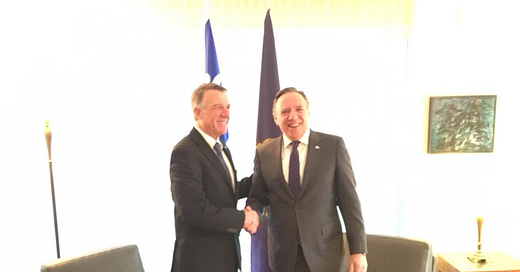Vermont, Quebec, and Trump's Thickening Border
The ties between Quebec and Vermont have been weakening over the past quarter-century, made worse by political posturing and tariff threats.
Last Saturday afternoon, there was something unusual at the Trader Joe’s market in Burlington. In the parking lot, there was not a single Quebec license plate—a stark contrast to a typical weekend before this year when about half the cars would bear Canadian plates. The last time this happened was during the pandemic lockdowns. This is a Trader Joe’s that acknowledges its Québécois clientele by employing a French-speaking crew member on weekends.
Cross-border traffic between Quebec and Vermont has dwindled since the pandemic border closures and has further declined amid recent political tensions. Donald Trump’s threats to impose tariffs on all Canadian goods, coupled with calls to annex Canada as “the 51st state,” have strained relations.
The ties between Quebec and Vermont have been weakening over the past quarter-century. The first blow came in 2001, when the September 11 terrorist attacks led to tighter border security. Both Canadians and Americans were required to carry passports or enroll in the NEXUS program, involving fees, a waiting period, and a background check. Since then, Vermonters have viewed crossing the border as a complicated undertaking. The Vermont weekly Seven Days, in its first summer guide to Quebec travel in 2023, asked, “Why don’t we come up here more often?” and cited fear of intrusive border searches and the need to carry a passport. Additionally, Quebec’s Bill 96, which strengthened the Charter of the French Language, has created the impression that francophones are becoming less tolerant of English-speaking visitors. Vermont media noted the remark by Minister of the French Language Jean-François Roberge that too much English was being spoken in the streets of downtown Montreal and portrayed it as directed at American tourists.
Media consumption shifts have also contributed to the growing disconnect. The migration of Canadian radio stations like CBC Radio One and Radio-Canada Première from AM to FM has removed Montreal stations from Burlington’s car radios, and Vermont cable TV providers have dropped Montreal stations from their lineups. In the Vermont mind, it has become easy to forget Quebec is there.
The rhetoric of American political figures has intensified these dynamics. Trump’s tariff threats and proposals to annex Canada have strained cross-border relations. For Vermont, whose economy relies significantly on electricity imports from Quebec—42% of its power is sourced from Hydro-Québec—and trade in sawlogs and hardwood, the imposition of steep tariffs could disrupt supply chains and threaten regional industries.
Vermont has lost 150 sawmills since 2000, leading loggers to process felled timber across the border. In 2024, Vermont imported $52 million in sawmill and wood products from Canada, with Quebec being its biggest export market for sawlogs and hardwood. Tariffs have the potential to put Vermont loggers out of business, especially as lumber may fall under the 50% “double tariff.”
Tourism remains a critical pillar of this bilateral relationship. Canadian visitors contribute approximately $150 million annually to Vermont's economy, with around 750,000 Canadians traveling to Vermont each year, representing about 5% of the state's total visitors. Their impact is particularly pronounced in northern Vermont, within range of day trips from Montreal and Sherbrooke. Jay Peak Resort relies on Canadians for 40–50% of its visitors, and the Kingdom Trails network historically draws 38% of its users from Canada. However, escalating political tensions and the fear of economic retaliation have led to a noticeable decline in cross-border tourism, with reports of Canadians canceling trips amidst uncertainty.
The cultural fabric of the Vermont–Quebec border communities is also under strain. The Haskell Free Library and Opera House, a historic institution straddling the border between Derby Line, Vermont, and Stanstead, Quebec, has long symbolized the unique bond between the two regions. Traditionally, Canadians could access the library without a passport, crossing a monitored sidewalk directly into the U.S. entrance. However, recent U.S. regulations now require Canadians to enter through the Canadian side or undergo U.S. security checks, disrupting a century-old tradition of cross-border cultural exchange. This change has sparked local outcry, with residents lamenting the erosion of a symbol of international cooperation and unity.
Efforts to mend these strained relations are underway. Vermont U.S. Senator Peter Welch convened a cross-border roundtable in Newport on March 18 with Canadian officials, including Marie-Claude Bibeau, Member of Parliament for Compton-Stanstead, Quebec, the Sherbrooke Chamber of Commerce, and business leaders from both sides. The focus was on addressing the economic fallout from Trump’s proposed tariffs and escalating trade tensions. Welch and Bibeau emphasized that 25–50% tariffs on Canadian imports like lumber, equipment for maple syrup, and agricultural goods would disrupt supply chains and raise costs for Vermont businesses. Poulin Grain warned of higher feed prices due to Canadian crop tariffs, and Jay Peak Resort reported Canadians—who account for 40–50% of revenue—are canceling trips over political tensions. Simultaneously, the Conseil du patronat du Québec (CPQ), in collaboration with the American Chamber of Commerce in Canada, conducted a mission to Vermont in March to mark Francophonie Month and strengthen economic ties.
The evolving narrative of the Vermont–Quebec relationship is one of paradox: while political posturing and tariff threats threaten to drive a wedge between neighbors, the realities of economic interdependence and cultural affinity compel both sides to seek pragmatic solutions. In this era of heightened nationalism and protectionist sentiment, the cross-border dynamics between Vermont and Quebec serve as a microcosm of broader tensions affecting North America. They remind us that despite geopolitical rhetoric, the ties of trade, energy, and shared culture are deeply embedded—and that any attempt to sever these bonds would exact a significant toll on both sides.
References:
https://accd.vermont.gov/tourism/research
https://www.bostonglobe.com/2025/01/31/nation/peter-welch-tariffs-trump/
https://www.cbc.ca/news/canada/montreal/cross-border-shopping-u-s-canada-tariffs-1.7481220
https://www.eia.gov/electricity/state/vermont/
https://ici.radio-canada.ca/nouvelle/2149295/fermeture-acces-canadien-bibliotheque-haskell-stanstead
https://macleans.ca/politics/quebec-french-language-laws/
https://www.sevendaysvt.com/guides/from-the-publisher-oh-canada-38494251
https://www.sevendaysvt.com/guides/qanda-following-seven-days-paper-trail-to-quebec-38492206
https://vermontpost.com/impact-of-canadian-tourism-on-vermont-attractions
https://vtdigger.org/2025/03/13/as-u-s-canada-relations-sour-vermont-businesses-are-facing-boycotts/
https://vtdigger.org/2021/06/15/towns-tourist-stops-await-reopening-of-the-border-with-canada/
https://vtdigger.org/2025/03/18/canadian-vermont-business-leaders-commiserate-at-newport-roundtable/
https://vtdigger.org/2025/03/13/as-u-s-canada-relations-sour-vermont-businesses-are-facing-boycotts/
https://www.wcax.com/2025/03/06/will-vermont-tourism-towns-face-canadian-backlash/
https://www.welch.senate.gov/sen-peter-welch-attends-forum-on-tariff-concerns/
https://www.wsj.com/world/quebec-language-police-french-english-words-franglais-3329dce2



Thoughtful and easily accessible article for lay readers…